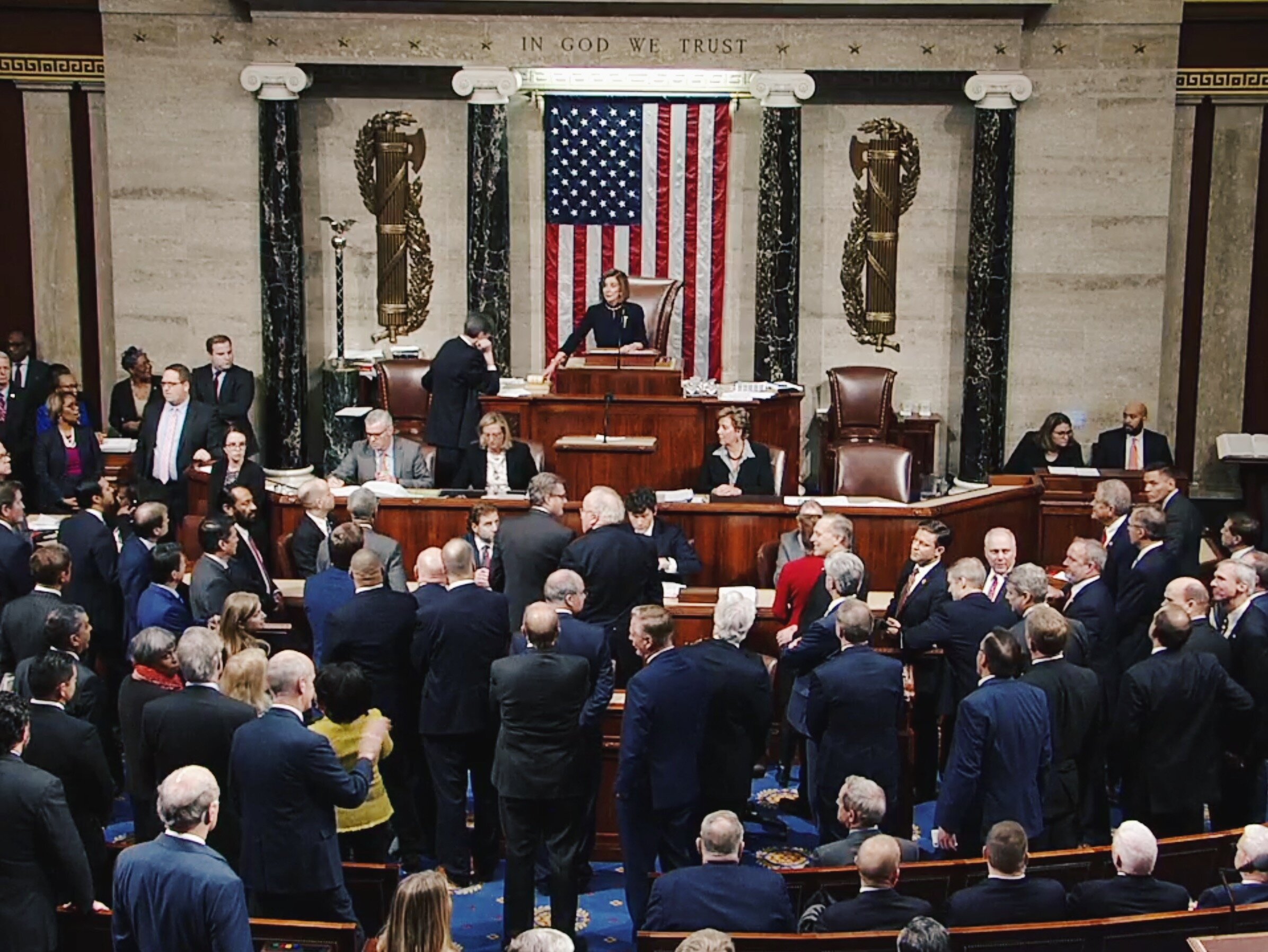Understanding the Impeachment
The House of Representatives Votes to Adopt the Articles of Impeachment (photo via Wikipedia).
As of yesterday, Donald Trump became the third president to ever be impeached by the US House of Representatives. But what does it really mean?
In an article in The Guardian yesterday, Nathan Robinson accurately described the Trump’s impeachment as an “anti-climax.” Ask anyone who has studied the Constitution and they will tell you that yes, soliciting foreign investigation into a political election rival is an impeachable offense. There’s no doubt about that, despite what Republicans are saying. But Robinson makes this point, with which I strongly agree:
Trump is facing impeachment for one of the least consequential bad acts of his career. The string of alleged sexual assaults? Deporting desperate migrants to their deaths? Destroying the possibility of preventing catastrophic climate change? Causing thousands of deaths by rescinding environmental rules and then covering up the human toll? Escalating drone strikes and then hiding the civilian deaths? These crimes will go uncharged and unpunished.
Clearly, Trump has committed crimes far worse than asking the President of Ukraine to interfere in the 2020 election. So why is this the issue impeachment has hinged on? I honestly don’t know the answer to that, because I was on the side of impeachment long, long ago. All of the reasons listed above are abuses of office and power. But this is the issue that has most alarmed Nancy Pelosi, Speaker of the House of Representatives, and Nancy yields the power, so the articles of impeachment were formally and finally announced in September.
Last night the House impeached the President on two counts: abuse of power (by using his office to solicit foreign intervention in a domestic election) and obstruction of Congress (for obstructing key witnesses from testifying against him in the ongoing hearings). This means that the House has charged Trump with misconduct, in the same way courts have charged former Trump associates with fraud, lying to Congress and investigators, and campaign finance violations. The case will move next to the Senate, where Trump will be put on trial and the fifty US senators will act as jurors. While the House majority is held by the Democrats, the Senate is held by the Republicans; this means that unless pigs start flying, Trump will be acquitted by the Senate and will remain President.
So why did the House move forward with articles of impeachment if Trump is likely to be acquitted in the Senate? Because it’s the right thing to do. Democrats have been accused time and time again of acting based on what is politically popular, not based on what is right. Impeachment is a chance to turn that around. Democrats have very little to gain from impeachment other than being on the right side of history. To many voters, that means a lot. I would rather be represented by people who did the right thing rather than the politically popular thing. There are many Democratic representatives in majority-Republican districts of the country who could potentially lose their seats because of this vote. Despite that, they voted to impeach Trump anyway. That takes guts and courage, something that is lacking on the Republican side of things.
Trump needs to be held accountable. At the risk of stating the very obvious, the founders of our country never wanted a president like Trump – a president who fancies himself a king – but they had the foresight to recognise that someone like him might come along. So they created restraints on the office through the separation of powers into the judicial, legislative, and executive branches of government. This hasn’t worked on Trump. He has stomped around on all of the norms we hold dear like a dinosaur stomping on a village. He has recruited the Republicans into propping up his presidency despite the overwhelming amount of evidence that he has abused his power and his office. Donald Trump won’t be removed from office, and that’s a devastating reality we must accept. But that certainly doesn’t mean that impeachment is the wrong move. Trump needs to be shown that there are still some elected representatives who will stand up to him, even if the political outcome isn’t the one we hope for.
Lauren Olmeda holds bachelor’s and master’s degrees in international relations. She works in public affairs in Dublin, Ireland and is Editor-at-Large of the Attic on Eighth.











